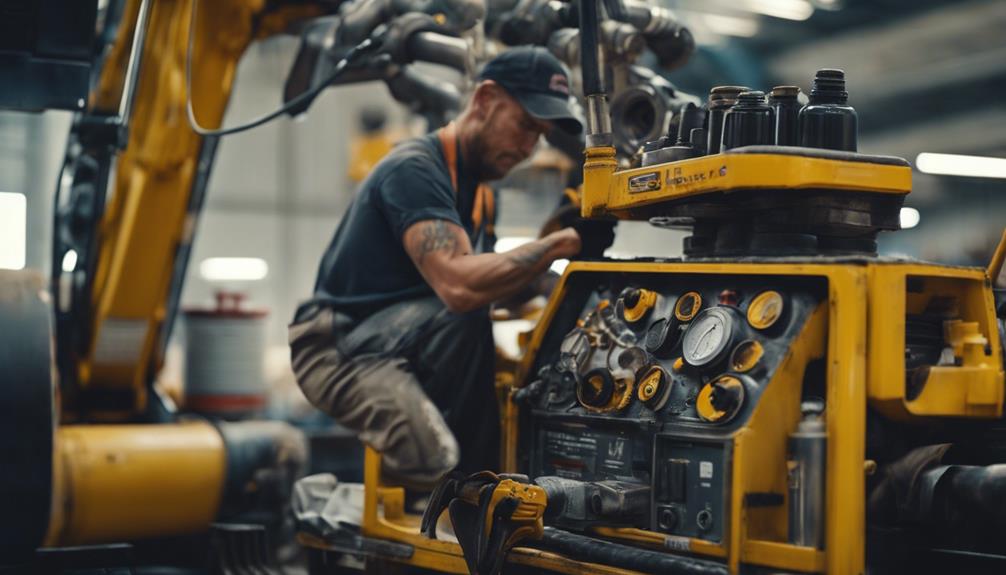5 Essential Tips for Sustained Heavy Machinery Care
Maintaining the long-term performance and durability of heavy machinery requires a strategic approach and attention to detail. From meticulous maintenance schedules to comprehensive repair records, each tip is crucial in ensuring your equipment operates at its best.
However, there are other key factors that are equally important but often overlooked in the care of heavy machinery. Let's explore the significance of monitoring fluid levels, providing proper training for machinery use, and considering environmental factors to protect your valuable assets.
By focusing on these essential aspects, you can enhance the efficiency and lifespan of your heavy machinery fleet.
Regular Maintenance Scheduling
Regular Maintenance Scheduling
Regularly scheduled maintenance is a critical component in maximising heavy machinery performance and minimising costly downtime. By adhering to manufacturer-recommended maintenance intervals, heavy machinery owners can reduce the risk of major breakdowns by up to 75%. This proactive approach not only improves equipment longevity but also helps in identifying potential issues before they escalate into costly repairs.
Routine maintenance plays a vital role in ensuring high fuel efficiency in heavy machinery, ultimately leading to cost savings in the long run. Moreover, scheduled maintenance contributes to improved equipment availability, which is important for uninterrupted operations in different industries.
Neglecting regular maintenance can result in decreased fuel efficiency, unexpected breakdowns, and reduced equipment availability, leading to significant downtime and increased repair costs. Hence, establishing a strong maintenance schedule is paramount for heavy machinery care and operational efficiency. By prioritising scheduled maintenance, heavy machinery owners can boost performance, extend the lifespan of their equipment, and minimise the risk of costly repairs, ultimately ensuring uninterrupted operations and maximising productivity.
Proper Machinery Use Training
Effective machinery use training is a fundamental element in reducing equipment damage risks and improving operational efficiency in heavy machinery operations. Proper training equips operators with the necessary skills to handle heavy-duty equipment correctly, minimising the chances of errors that could lead to damage.
Here are key points to contemplate:
- Trained operators can identify maintenance issues early, minimising downtime.
- Effective training improves safety through regular machine inspection protocols.
- Operators trained in proper equipment care exhibit higher productivity rates.
- Providing materials and manuals for machinery use elevates operator confidence.
Documenting Repairs and Services
Detailed documentation of repairs and services plays a pivotal role in ensuring optimal fleet maintenance practices. By meticulously recording repair documentation, including details such as the date, time, and parts replaced, organisations can establish thorough maintenance records. This information is invaluable for creating specialised maintenance programmes tailored to the specific needs of each piece of equipment.
Additionally, maintaining accurate records eases the processing of warranty claims and enables effective tracking of equipment history.
For efficient record-keeping, organisations can utilise different tools ranging from simple spreadsheets for smaller operations to advanced preventive maintenance software like UpKeep or ePAC for larger fleets. Implementing maintenance software such as Innomaint can further streamline preventive maintenance tasks, leading to improved equipment upkeep and longevity.
Essentially, the systematic documentation of repairs and services is not just a bureaucratic task but a strategic approach to enhancing fleet maintenance efficiency and maximising the lifespan of heavy machinery.
Monitoring Fluid Levels
A vigilant approach to monitoring fluid levels in heavy machinery is crucial for maintaining operational efficiency and extending equipment lifespan. Regularly checking and maintaining proper fluid levels offer a range of benefits that directly impact the performance and longevity of the machinery:
- Optimal Performance: Ensuring the right fluid levels prevent overheating and contribute to the machinery's optimal performance.
- Reducing Wear and Tear: Proper fluid levels help in reducing wear and tear on critical components, thereby extending the machinery's lifespan.
- Early Detection: Monitoring fluid levels aids in the early detection of leaks or contamination, averting potentially costly repairs.
- Preventing Equipment Failure: Incorrect fluid levels can lead to equipment failure, resulting in downtime that affects productivity and profitability.
Considering Machine Environment
Considering the Machine Environment
Monitoring fluid levels in heavy machinery is just one aspect of maintenance; considering the machine environment is just as critical for ensuring optimal performance and longevity. Extreme weather conditions such as heat, cold, and humidity can impact heavy machinery, affecting its efficiency and durability. Operating heavy machinery in harsh environments with dust, debris, or corrosive elements can accelerate wear and tear on equipment, leading to potential breakdowns and costly repairs. Proper storage practices are crucial to safeguard machinery from damaging elements like rain and snow, prolonging its lifespan. Regular maintenance is key in challenging environments to address issues promptly and prevent unexpected failures. Awareness of environmental factors and adapting maintenance practices accordingly can contribute to maximising heavy machinery care, reducing the risk of breakdowns, and minimising the need for expensive repairs. By prioritising the consideration of the machine environment, operators can optimise the performance and reliability of their equipment.
Conclusion
In conclusion, sticking to a thorough maintenance plan, documenting procedures diligently, keeping machinery clean, providing operator training, and monitoring fluid levels are crucial for maintaining heavy machinery. These essential tips work together to increase the lifespan, efficiency, and dependability of your equipment, reducing the chances of breakdowns and costly repairs. By following these guidelines consistently, businesses can boost the performance and longevity of their heavy machinery.
If you're feeling overwhelmed or unsure about where to start, remember that Bendet Plant is here to help. Reach out to us for guidance and support, as we're always ready to assist you on your maintenance journey.
For more information about Towing, Tool Rentals, or Plant Hire, don't hesitate to contact us. We're here to answer any questions you may have and provide further insights into our services. Take the first step towards enhancing your equipment by reaching out to us today.
Remember, the key to sustained heavy machinery care lies in adherence to these fundamental practices. By prioritising maintenance, documentation, cleanliness, training, and monitoring, you can ensure the longevity and efficiency of your machinery for years to come.
